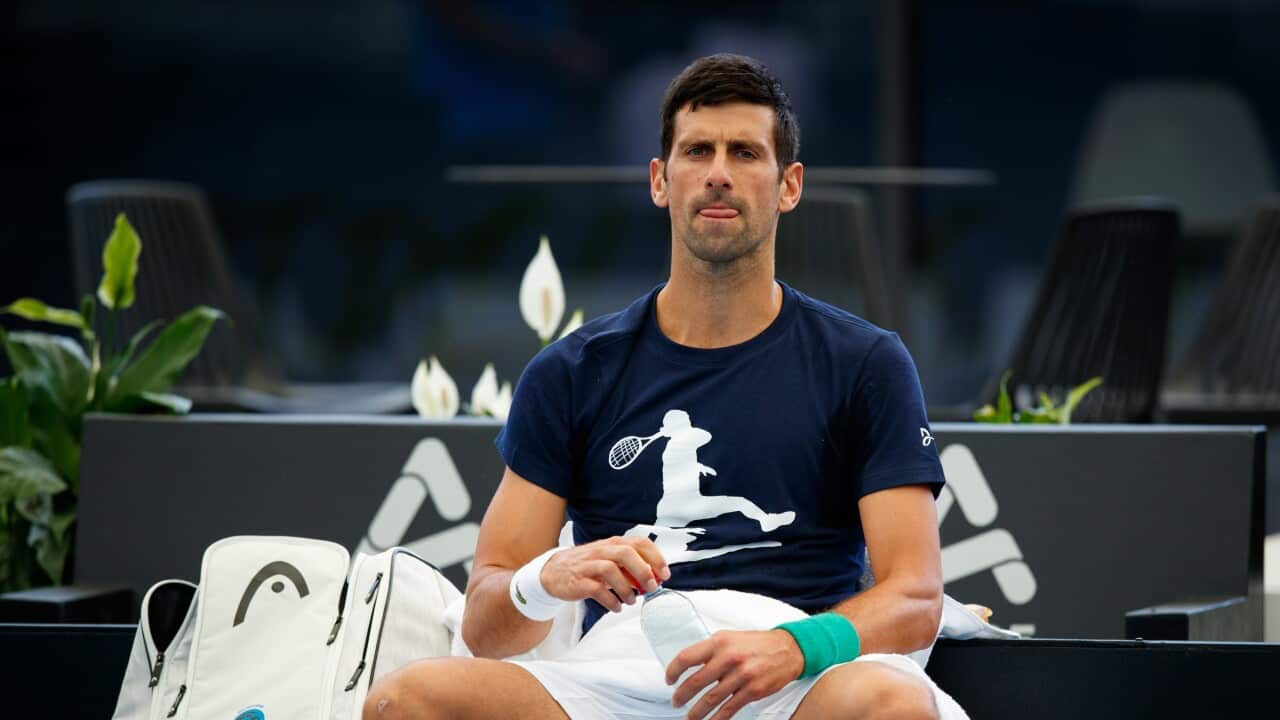Key Points
- On Monday, Tennis Australia confirmed players who test positive to COVID-19 can compete at the Australian Open.
- Cricketers who have tested positive to the virus have also been allowed to compete this summer.
- Experts say this represents a change in COVID-19 attitudes, but warn it could have dangerous public health impacts.
A year after former tennis world number one over his vaccination status, meaning he couldn't play in the Australian Open, our COVID-19 restrictions look very different.
On Monday, Tennis Australia confirmed players could potentially participate in this year's tournament if they have COVID-19.
It comes after cricketer Matthew Renshaw was allowed to play for Australia in the Sydney Test against South Africa despite returning a positive test, with Melbourne Stars duo Marcus Stoinis and Joe Burns doing the same in a Big Bash League game.
Australian Open tournament director Craig Tiley said the change in rules reflected the situation across Australia, where mandatory testing and self-isolation directives have largely been scrapped.
"We just wanted to follow what's currently in the community," Mr Tiley said.
"We have gone a step further by making a recommendation around staying away when you're ill, and that our medical staff ... will continue to monitor that, with the players individually as well."
Should we be concerned about COVID-19 on the court?
In 2022, players at the Australian Open faced a series of stringent requirements including being vaccinated and undergoing daily testing, while in 2021 a 'bubble' was enforced and crowds locked out to contain an outbreak of the virus in Melbourne.
This year, there are no testing or vaccination requirements.

Novak Djokovic, seen here playing in the Adelaide International, will play in this year's Australian Open tournament after missing out last year due to COVID-19 restrictions. Source: Getty / Sarah Reed
Dr Joel Miller, associate professor at La Trobe University, says while tennis players taking to the court with COVID-19 would be unlikely to pose a significant health risk, the same attitude should not be broadly applied to other workplaces or social situations.
"For tennis itself, there's not much risk that the players are putting each other at (on the court), so from that point of view I don't think there's a huge amount of risk from players in a match," Dr Miller said.
"I don't think this is a big risk to the vast majority of Australia in the way that maybe a year or two years ago it could have been, but if it becomes normalised that poses a bit of a problem."
Have attitudes toward COVID-19 become too relaxed?
Emma Miller, Adjunct Associate Professor at the University of Adelaide and epidemiologist and researcher, told SBS News the relaxation of rules could be attributed to a combination of scientific and socio-economic factors.
"A high percentage of the eligible population is vaccinated at least twice, which does confer some protection against severe disease," she said.
"There are also all sorts of social and political benefits from having an open economy.
"But I do think we have possibly gone too far in one direction, and I would prefer to see reporting going on about positive testing, and mandated masks in certain areas, particularly in sporting venues."
Associate Professor Miller says while it is not surprising to see rules relaxed at sporting competitions, the change in public health attitudes and lack of reporting could be dangerous in terms of contagious new sub-variants or rising case numbers.
"I think it's a bit of a public health tragedy, the only way we'll really know that there is a problem with any new sub-variant or variant that comes is when we start noticing that people are dying more or being hospitalised more," she said.
"I'm not comfortable at all with this (approach to) living with COVID-19, but I can see why those rules apply in the sporting context."
Could you be expected to go to work with COVID-19?
While professional tennis and cricket players are now able to work with the virus, and in some cases can do so while remaining physically distant from teammates or opponents, experts say the same attitude should not be applied to the rest of the population.
Latrobe University's Dr Miller says going into an office with COVID-19 could pose a more significant risk to colleagues or colleagues' families.

Melbourne Stars cricketers Joe Burns (left) and Marcus Stoinis both tested positive for COVID-19 ahead of their Big Bash League match against the Sydney Thunder in Canberra last month but were allowed to play. Source: AAP / Lukas Coch
"In a place where you're working closely together with your colleagues, that's potentially a really big risk ... you might not know if somebody has cancer or has had an organ transplant."
He says while self-isolation rules no longer apply, those who test positive to COVID-19 should still make efforts to minimise contact with others and reduce risks of transmission.
"If this becomes normalised, I do worry about that ... I think people who have Covid should, wherever possible, stay home for a few days and try to manage the risk of transmitting to others," Dr Miller said.
"I certainly hope employers would not be expecting their employees to come to work if they've tested positive, and if you stay home, you're posing less of a risk to your coworkers."
A Tennis Australia spokesperson told SBS News there would be a range of health measures in place at the Australian Open with a focus on the prevention and management of all infectious illnesses.
"We are working with the players and their teams, along with staff, to ensure everyone follows simple infection control measures to manage their health and minimise their risk of illness," the spokesperson said.
"Players with any symptoms of an infectious illness should seek advice from the medical team to help manage their treatment. They will also have access to separate facilities."












